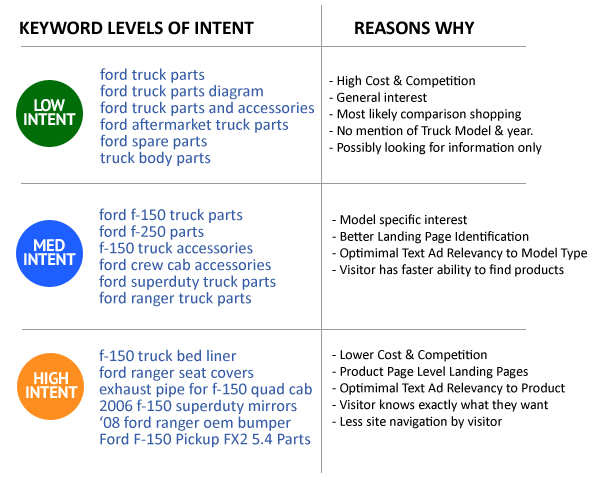 In the process of keyword research and expansion, advertisers must understand that even though keywords all look the same when they are grouped together, they all have different intents and interpretations which require different levels of classification. This organization of keywords is not only good for the building blocks of Quality Score and effective Adgroup structures, it also serves as a best practice to understanding how to reach customers with the highest level of intent to make a conversion. Let’s discuss.
In the process of keyword research and expansion, advertisers must understand that even though keywords all look the same when they are grouped together, they all have different intents and interpretations which require different levels of classification. This organization of keywords is not only good for the building blocks of Quality Score and effective Adgroup structures, it also serves as a best practice to understanding how to reach customers with the highest level of intent to make a conversion. Let’s discuss.
Keyword Research Levels
When keyword research is being performed, many advertisers rely on keyword research tools to do the hard work for them. So, for example, an advertiser who sells Ford Truck Parts online would typically use a keyword research tool under the base term “Ford Truck Parts,” and they would get a big list of related keywords about Ford Truck Parts. However, even though the keywords phrases that were suggested are related, many of them would have different levels of intent that would either convert into a sale or just a possible returning visitor in the future. Let me explain.
Understanding Keyword Intent
When a visitor is searching for a specific product or service, they are more likely to either make a purchase or continue to do some comparison shopping based on price, shipping, reputation, payment methods, etc. Moreover, even though the keyword may have a high intent value, the chances of an immediate conversion are not always 100%. It is this behavior that Google and other platforms have a 30-45 day cookie in place so that they can track the eventual conversion back to the keyword & text ad. Remember, it is much easier to comparison shop online, than it is to walk around the malls.
Visual Example of Keyword Classification
Optimal Campaign and Adgroup Structure
Now that we have an understanding of classifying keywords based on their level of intent to create an action, the second most important task is to build the campaign strategies around them. This is very important because it enables advertisers to allocate specific budgets based on performance forecasts. There are many benefits to this methodology because it not only creates a long term strategy for new product offerings, it also sets the stage for continued testing of Text Ads and Landing Pages based on the intent levels already identified.
In Conclusion:
Keywords that may look very relevant to each other most likely have an entirely different and deeper interpretation assigned to them. As PPC Marketers, we are prone to follow the best practices of keyword relevancy all the way from campaign level to the landing page. However, in this highly competitive market as well as struggling economy, it is our job to make sure our clients (or companies) are getting the best ROI% possible. Now, unless we become mutants and can crack the technology behind the “real-life” Dr. Charles Xavier from X-men, the best we can do is continue to “think outside the box.”




